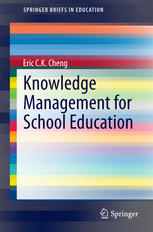

Most ebook files are in PDF format, so you can easily read them using various software such as Foxit Reader or directly on the Google Chrome browser.
Some ebook files are released by publishers in other formats such as .awz, .mobi, .epub, .fb2, etc. You may need to install specific software to read these formats on mobile/PC, such as Calibre.
Please read the tutorial at this link. https://ebooknice.com/page/post?id=faq
We offer FREE conversion to the popular formats you request; however, this may take some time. Therefore, right after payment, please email us, and we will try to provide the service as quickly as possible.
For some exceptional file formats or broken links (if any), please refrain from opening any disputes. Instead, email us first, and we will try to assist within a maximum of 6 hours.
EbookNice Team

Status:
Available0.0
0 reviewsThis book introduces the application of knowledge management (KM) theories, practices, and tools in school organization for sustainable development. Schools in Asia Pacific have long faced a variety of challenges in terms of sustainable development under the education reforms and curriculum reforms to meet the demands of a knowledge society. Schools are inevitably expected to develop human capital for the knowledge society within the competitive global economy, and to interact with its policy environment and know how to leverage pedagogical knowledge. The high speed of expansion change and expansion of knowledge have dramatically influence the development of flexibility of teacher and school works. The nature of teacher work becomes increasingly less routine, more analytical, and disruptive yet often come with a sense of urgency and need to be more collaborative. Teachers not only require data and information, but also knowledge and experience of individual, they also need to collaborative task execution, decision making and problem solving. Helping school leaders and teachers to manage their knowledge and become “know how” to cope with the change is important.